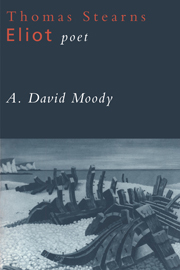Book contents
- Frontmatter
- Contents
- Acknowledgments
- Preface to second edition
- Introduction
- 1 The growth of the poet's mind
- PART ONE 1905–1912 – AN INDIVIDUAL TALENT
- Oxford University Extension Lectures
- PART TWO 1912–1922 – ‘SHALL I AT LEAST SET MY LANDS IN ORDER?’
- PART THREE 1922–1930 – ‘ORDINA QUEST’ AMORE, O TU CHE M' AMI'
- PART FOUR 1931–1939 – THE WORD IN THE DESERT
- PART FIVE 1939–1945 – APOCALYPSE
- AFTERWORDS
- 10 The Poet observed
- APPENDICES
- Notes
- Index
10 - The Poet observed
Published online by Cambridge University Press: 05 February 2012
- Frontmatter
- Contents
- Acknowledgments
- Preface to second edition
- Introduction
- 1 The growth of the poet's mind
- PART ONE 1905–1912 – AN INDIVIDUAL TALENT
- Oxford University Extension Lectures
- PART TWO 1912–1922 – ‘SHALL I AT LEAST SET MY LANDS IN ORDER?’
- PART THREE 1922–1930 – ‘ORDINA QUEST’ AMORE, O TU CHE M' AMI'
- PART FOUR 1931–1939 – THE WORD IN THE DESERT
- PART FIVE 1939–1945 – APOCALYPSE
- AFTERWORDS
- 10 The Poet observed
- APPENDICES
- Notes
- Index
Summary
And every moment is a new and shocking
Valuation of all we have been.
With the completion of Four Quartets Eliot ceased to be a poet, and became in his art simply a dramatist. His pre-war drama had worked on both levels, the human and the transcendental; but in the three plays produced in the last twenty years of his life the metaphysical poet disappears in the writer of well-made drawing-room comedies. Regrettable as this may be, it was not simply a consequence of failing powers. For one thing, the poet could only have repeated himself, having said all that he had to say in the perfected Quartets. For another, it is just by their not being poetry that the late plays add something to his oeuvre. It is not a new vision that they offer, but a progressive revision of that of the poet who would be a saint. The Cocktail Party transposes The Family Reunion and Four Quartets into the audience's own terms, and in doing so significantly alters the emphasis towards the occupations of ‘most of us’. In The Confidential Clerk the dramatist develops a point of view distinct from that of the poet, and for the first time in Eliot's work the poet is observed in a light other than his own. Then The Elder Statesman, which is in certain respects a summing up of the whole of the poet's life-work, brings us at the end to a radical revaluation of it.
- Type
- Chapter
- Information
- Thomas Stearns Eliot: Poet , pp. 267 - 298Publisher: Cambridge University PressPrint publication year: 1995



